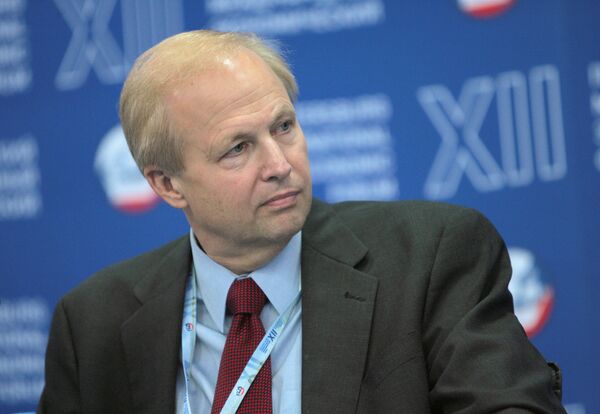American Robert Dudley is to take over the Gulf oil spill response as BP's new CEO replacing British Tony Hayward on October 1. BP also reported its second-quarter loss of $17.15 billion, a record sum lost by a global oil producer. However, global markets responded calmly to this news, with a slight rise in oil prices, as they had initially to the Deepwater Horizon accident.
Hayward's resignation was in fact predictable, even though BP sources had been denying the rumors for a long time. Analysts said hours after the Deepwater Horizon accident that Hayward's days as CEO were numbered. There was no other option, as the man is responsible - formally at least - for 11 deaths and one of the largest environmental catastrophes ever dubbed the "oil Chernobyl."
In the United States, he is unofficially referred to as public enemy number one. Considering the disastrous aftermath of the oil spill, as well as the unimpressive progress BP has been making to stop it, one could say Hayward should have gone much sooner. U.S. President Barack Obama said in early summer that if Tony Hayward had been his employee he would already have been fired.
The BP management reshuffle is unlikely to accelerate the clean-up process. The company had in fact made a commitment to contain the spill by now; however, the cap installed last week has proved ineffective. Now the company has vowed to contain the leak by the beginning of autumn.
Curiously enough, the largest environmental catastrophe in the past few decades has not had any serious economic consequences. The most serious impact that can now be expected is the likely effect on BP's position on the oil market. The company is already beleaguered, having lost a $350 million drill rig, spent $4 million on the cleanup and relief, and paid enormous sums in damages. It is facing over 127 lawsuits. Its total second-quarter losses exceeded $17 billion, while its market value plummeted by 40%. The British oil producer has already begun selling off property: in July, it put $7 billion worth of natural gas assets and gas refineries on the market. The property was bought by the U.S. company Apache.
Yet, unlike Chernobyl, which prompted many countries to wind up their nuclear energy programs, this oil spill only provoked a short-term rise in oil quotes.
Hours after the tragedy analysts were reassuring us that we are not in for any economic shocks, except maybe for speculators trying to push oil prices up.
This is quite logical. First of all, the well BP was drilling in the Gulf of Mexico was experimental; therefore, its loss could not have affected commercial oil production. Second, the Chernobyl syndrome and related phobias were deliberately fuelled by the oil lobby.
A reverse situation, in which nuclear power producers or some alternative energy lobby similarly targets oil producers, is fundamentally impossible today. The global economy is entirely dependent on oil and oil-related infrastructure. Even the United States, one of the most technologically advanced nations, receives 85% of the energy it requires from burning oil and gas.
The environmental catastrophe may force the United States to postpone its new energy program, presented in March 2010, especially the part involving offshore oil and gas development. The U.S. government intended to lift the offshore development ban imposed for environmental reasons for 20 years.
The Gulf of Mexico holds an estimated 14.5 billion barrels of crude; these reserves could reduce the U.S. economy's dependence on oil and gas imports, which would be bad news for traditional oil and gas exporters, including Russia.
Russian officials and oil producers have issued repeated reassurances in the past six months, saying that the Pacific offshore oilfields development won't threaten Russia's position as a major oil exporter, and that neither would the development of alternative energy sources, such as shale gas, in the United States. However, one might assume that the very attention given to this issue in Russia proves the opposite. From this perspective, the oil spill could serve Russia's interests to some extent. However, this would not be for long, as the U.S. government has not banned offshore development forever - it has only suspended issuing new drilling licenses until September.
It is also highly important that Robert Dudley's appointment as BP CEO does not affect cooperation between Russian and U.S. partners. Dudley headed TNK-BP Management (the company managing TNK-BP's assets) until 2008, leaving after a major row between the joint venture's Russian and British shareholders. The Russian shareholders insisted on his resignation, claiming that he was pursuing a policy only benefiting the British partners.
Vlad Grinkevich, RIA Novosti economic commentator
The opinions expressed in this article are the author's and do not necessarily represent those of RIA Novosti.

